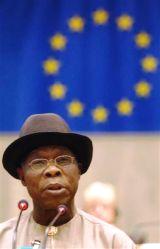Nigeria proposes Africa-run tribunal to try Sudan war crimes suspects
By NICK WADHAMS, Associated Press Writer
UNITED NATIONS, Mar 17, 2005 (AP) — Nigeria proposed setting up an African-run tribunal to prosecute human rights violators and war crimes suspects from Sudan’s conflict-wracked Darfur region, a possible bid to break an impasse in the U.N. Security Council, according to a document released Wednesday.
 The Nigerian proposal, made on behalf of the African Union which it currently heads, comes as the Security Council is wrestling over a new resolution for a 10,000-strong peacekeeping force to help monitor a peace agreement ending a 21-year civil war between the government and rebels in southern Sudan.
The Nigerian proposal, made on behalf of the African Union which it currently heads, comes as the Security Council is wrestling over a new resolution for a 10,000-strong peacekeeping force to help monitor a peace agreement ending a 21-year civil war between the government and rebels in southern Sudan.
While the U.S.-sponsored resolution is meant to help Sudan recover from the civil war, it is also aimed at fostering peace in Darfur, where the United Nations now estimates that about 180,000 people have died of fighting, disease or malnutrition since October 2003. But a key sticking point has been how to bring war crimes suspects to justice.
Diplomats say a dozen of the 15 council members back a U.N. panel’s call to refer suspects to the International Criminal Court. The United States, however, vehemently opposes the world’s first permanent war crimes tribunal and wants suspects to be tried by a new tribunal in Arusha, Tanzania.
The Nigerian letter, dated Tuesday, said the various proposals fall short because they don’t provide “the desired healing and reconciliation for the parties involved” and “may not be ideal in handling the delicate political crisis in the Darfur region of Sudan.”
The letter was addressed to the European Union, whose 25 members are parties to the International Criminal Court. It said Sudan’s government supports the proposal.
U.N. diplomats said they were still discussing the proposal and had no immediate response. The Nigerians did not say who would pay for their proposed tribunal.
Meanwhile Wednesday, U.S. Mission spokesman Richard Grenell said the United States will again propose extending the U.N. political mission in Sudan for a week while members wrestle over the resolution.
The weeklong extension would follow a similar one passed last week to try to bridge the remaining differences.
“Negotiations are close but we will need another week before we can move forward on the Sudan resolution,” Grenell said. “We will circulate a resolution to extend the current mandate by one week.”
The latest U.S. draft resolution circulated last week would establish a broader U.N. mission and authorize a 10,000-strong U.N. peacekeeping force to monitor a peace accord ending the 21-year civil war.
The U.S. proposal calls for a travel ban and asset freeze on those who impede the peace process, threaten stability in Darfur, violate international humanitarian or human rights law, or are responsible for military overflights.
The United States dropped an earlier proposal to extend an arms embargo — already in force in Darfur for both black African rebel groups and the Arab militia known as Janjaweed — to include Sudan’s government. China, Russia and Algeria were opposed, according to U.N. diplomats, speaking on condition of anonymity.
Sanctions have been a sticking point, but some diplomats said Tuesday that the issue had been largely resolved.
The U.N.-appointed panel concluded that crimes against humanity — but not genocide — probably occurred in Darfur where 2 million people have been forced to flee their homes.
A U.S. draft resolution from last week has the note “to be developed” next to the proposal on bringing to justice those responsible for “crimes and atrocities.”
The United Nations now estimates that about 180,000 people have died in Darfur as a result of violence, disease or malnutrition since October 2003 _ 2 1/2 times the previous estimate.
